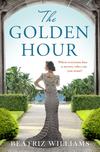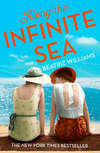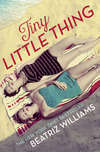Read the book: «The House on Cocoa Beach: A sweeping epic love story, perfect for fans of historical romance»


Copyright

Published by HarperCollinsPublishers Ltd
1 London Bridge Street
London, SE1 9GF
First published in the UK by HarperCollinsPublishers 2017
Copyright © Beatriz Williams
Cover design by Charlotte Abrams-Simpson © HarperCollinsPublishers Ltd 2016
Cover photographs © Gordon Parks/The LIFE Picture Collection/Getty Images (figure); Amy Weiss/Trevillon Images (veranda); Yolande de Kort/Trevillon Images (distant house); Shutterstock.com (palm trees and aged paper texture)
Beatriz Williams asserts the moral right to be identified as the author of this work.
A catalogue copy of this book is available from the British Library.
This novel is entirely a work of fiction. The names, characters and incidents portrayed in it are the work of the author’s imagination. Any resemblance to actual persons, living or dead, events or localities is entirely coincidental.
All rights reserved under International and Pan-American Copyright Conventions. By payment of the required fees, you have been granted the non-exclusive, non-transferable right to access and read the text of this e-book on screen. No part of this text may be reproduced, transmitted, down-loaded, decompiled, reverse engineered, or stored in or introduced into any information storage and retrieval system, in any form or by any means, whether electronic or mechanical, now known or hereinafter invented, without the express written permission of HarperCollins.
Source ISBN: 9780008132675
Ebook Edition © July 2017 ISBN: 9780008132682
Version: 2017-05-31
Dedication
To the land of Florida—its dreamers, its builders, its mavericks, and its scoundrels. (Sometimes all four at once.)
Table of Contents
Cover
Title Page
Copyright
Dedication
Prologue
Chapter 1
Chapter 2
Chapter 3
Chapter 4
Chapter 5
Chapter 6
Chapter 7
Chapter 8
Chapter 9
Chapter 10
Chapter 11
Chapter 12
Chapter 13
Chapter 14
Chapter 15
Chapter 16
Chapter 17
Chapter 18
Chapter 19
Chapter 20
Chapter 21
Chapter 22
Chapter 23
Chapter 24
Chapter 25
Chapter 26
Chapter 27
Chapter 28
Chapter 29
Chapter 30
Epilogue
Author’s Note
Acknowledgments
Keep Reading …
About the Author
By the Same Author
About the Publisher
Prologue
May 16, 1919
My dear wife,
Let me tell you about this pen.
Handsome object, made of black enamel, repeating fleur-de-lis motif in gold leaf. Casing somewhat scratched owing to years of hard use (rather like its owner). Knows you well enough, I expect, to write this letter without instruction. Anyway, I wish it would. I have been holding the damned thing for an hour at least. Turning it about between my fingers. Getting up and walking around the room. Sitting and staring and resolving.
The truth is, I’m afraid I don’t know what to say—I don’t know what to write to make you believe in me again. I stand accused and convicted of a despicable crime, and you never allowed me a word in my own defense. If I could, I’d whisper in your ear the entire truth, but I suspect you wouldn’t believe me, would you? God knows, as a practical matter, you shouldn’t believe me. Anyway, I can’t tell you the truth, at least not yet, so that’s that.
Instead of relying on your faith, then, I shall have to attempt the next best thing, the hardest thing. I am going to prove my—I was going to say innocence, but that’s not quite true enough, is it? I am not an innocent man, and I’ve never pretended to be, at least with you—the one person with whom I never pretended. But I can insist I’m innocent of this one crime at least—that I married you for yourself alone —and since I’m afraid, in the wake of my parents’ deaths, the house must now be sold for taxes and the estate broken up, I shall take up the last inheritance remaining to me and make something of myself at last: something, I hope, you will one day recognize as the man you thought you had married.
I shall write my next letter from the mosquito-bitten town of Cocoa, Florida, at the head of a once-grand shipping empire, which I intend to resurrect for your sake. And then—well, what? You will decide, my own dear phantom, my irreplaceable and inalienable wife, my own Virginia. If you’ll remember—if you’re honest in remembering me—I have always allowed you to choose for yourself.
In the meantime, may God watch over you.
Yours always,
S.F.
CHAPTER 1
Cocoa Beach, Florida, June 1922
Someone has cleared the ruins away, but you can still see that a house burned to the ground here, not long ago. The earth is black and charred, and the air smells faintly of soot.
In the center of what must once have been a courtyard, a modest stone fountain has toppled from its pedestal. Already the weeds have begun to sprout from the base, encouraged by the hot, damp sunshine and the fertile soil. Everything grows in Florida. Grows and grows, unchecked by any puny human efforts to control nature’s destiny. I sink to the edge of the pedestal and call to my daughter, who’s poking a stick through the long, sharp grasses that grow along the perimeter of the paving stones. She looks up in surprise, as if she’s forgotten I exist, and runs to me on her stubby bare legs. On her mouth is the same startling smile that used to light her father’s face, and there are moments—such as this one—when the resemblance strikes me so forcefully, I can’t breathe.
“Mama! Mama! There mouse!”
“A mouse? In the grass? Are you sure?”
“Yes, Mama! Mouse! He run away.”
“Of course he did, darling, if you poked him with your stick.”
Without another word she burrows her hot, wriggling body into my chest, and I’m not one to waste such an opportunity. Not me. Not now. I clasp Evelyn between my arms and bury my face in her sweet-smelling hair, and I breathe her in, great lungfuls of Evelyn, as if I could actually do that, if I inhaled with enough strength and will. Breathe my daughter’s spirit into mine.
I haven’t told her that her father died here four months ago, on this very patch of ground, or even that he built this house and lived in it while we—Evelyn and I—inhabited our comfortable brownstone on East Thirty-Second Street in New York City, together with Grandpapa and Aunt Sophie. For one thing, I don’t want to frighten her with the idea that a person could burn to death at two o’clock in the morning in his own house, just like that. For another, she’s not that curious about him, not yet. She’s not yet three years old, after all, and she doesn’t know any other little girls. Doesn’t know that most of them have both mothers and fathers, living at home together, sometimes with brothers and sisters, too. One day, of course, she’ll want to know more. She’ll ask me questions, and I’ll have to think of plausible answers.
And there is another reason, a final reason. The reason I’m here in Florida to begin with, examining this blackened ground with my jaded eyes. I suppose I’ll tell Evelyn about that, too, when the time comes, but for now I’m holding this reason inside my own head and nowhere else. I’ve learned, over the years, to keep my private thoughts strictly to myself.
Behind us, Mr. Burnside clears his throat in that slight, unnecessary way that lawyers have. I imagine they think it conveys discretion. “Mrs. Fitzwilliam,” he says.
“Yes, Mr. Burnside?”
“Have you seen enough? I hate to hurry you, but we do have a whole mess of appointments this morning.”
Mr. Burnside, you understand, likes to keep to a tight schedule, especially in the face of this shimmering June sun, which forces all business around here to conclude by lunchtime. After which Mr. Burnside will spend the rest of his day inside a high-ceilinged, north-facing room, sipping a cool, strong drink while an electric fan rotates above him. If he can spare the energy, he might turn over a paper or two on his desk.
On the other hand, he’s an extremely competent man of affairs, as I’ve had plenty of occasion to discover in the past two months, and the sound of his voice—practical, confident, somewhat impatient—is enough to stiffen my resolve. To blow away the dust of regret, or nostalgia, or grief, or whatever it is that’s stinging my eyes, that’s clogging my chest as I hold Simon’s daughter in my arms and try to imagine that Simon is dead. Dead. What a word. An impossible word, as unlike Simon as clay is to fire. I kiss the top of Evelyn’s head, detach her from my arms, and rise to my feet. The early sun catches my back. Not far away, the ocean beats against the yellow sand, and the sound makes me want to take off my shoes and socks and wander, aimless, into the surf.
Instead, I say: “Are you certain the remains belonged to my husband?”
“Yes, ma’am. His brother identified the body.”
“Samuel.”
“That’s the man. Big fella.”
“And this was Simon’s house, of course. There’s no mistake about that?”
“Oh, no, ma’am. No mistake about that. Had the pleasure of visiting here many times myself. Lovely place. Like one of those Italian villas. There were lemon trees in this courtyard, real pretty. A real shame, Mrs. Fitzwilliam. Terrible, terrible shame that you never saw how lovely it was.”
I gaze at him coldly, and he coughs and turns away, as if to survey the empty, overgrown plot around us. The breeze touches the ends of his pale jacket. His straw hat glows in the sun. He inserts his fingers into his sweating collar and says, “Have you thought about what you’ll do with the place? You can get a good price for the land, if you don’t mind my saying so. Folks are paying top dollar these days for a plot of good Florida land, let alone one as nice and big as this, looking out on the ocean.”
Across the road, at the edge of the yellow beach, an especially large wave rises to the sky, gathering strength and power, until it can’t bear the strain any longer and dives for shore in a long, elegant undulation, from north to south. An instant later, the boom reaches us, like the firing of a seventy-five-millimeter artillery shell—a sound I know all too well. My nerves flinch obediently.
But I’m an old hand at disguising the flinch of my nerves. Instead of jumping at the sound of a crashing wave, I brush an imaginary patch of dirt from my dress and reach for Evelyn’s sticky hand.
“I think we should visit the docks next, don’t you think? So we don’t run late on our schedule.”
Mr. Burnside frowns, causing his bottlebrush mustache to twitch under his nose.
“Of course,” he says. “It’s your property, after all.”
IN ADDITION TO A THOUSAND or so acres of mature citrus, a shipping company, the ruined house on Cocoa Beach, and a hotel in town (in which he kept a private apartment for his own use), Simon has also left me a beautiful sky-blue Twin Six Packard roadster, which Mr. Burnside now drives at thirty exuberant miles an hour toward the long, narrow bridge across the Indian River, where the little boomtown of Cocoa perches on the shore and makes itself a living.
On another day, I would have liked to drive myself. This is, after all, my car. But the estate is still in probate, and anyway Mr. Burnside knows the way, while Florida’s still a mystery to me. Why, I don’t even know the name for this thick, rampant vegetation that spreads around us, creeping along the edges of the road, but as the Packard plows along the raised bed, top down and windows lowered, I think—for the first time in years—of the hedgerows of Cornwall. The way they block everything else from view, everything ahead of you and everything to the side, so that you never know what’s coming around the next curve. Those shrubs might be hiding anything.
“How much farther?” I call out above the roar of the engine and the heavy, warm draft blowing past our ears.
“Bridge is up ahead!”
“What are these shrubs and trees growing alongside?”
“That? Mangrove.”
“Pardon me?”
“MANGROVE, Mrs. Fitzwilliam! That’s MANGROVE! Grows EVERYWHERE around here, where the ground’s LOW and SWAMPY, and it’s mostly LOW and SWAMPY in these PARTS!”
Mangrove. Of course. One of those things you hear about—a mangrove swamp, how exotic—but never actually see. And here it is, spreading everywhere, tangled and salty and very much at home.
“Darned STUFF!” Mr. Burnside continues. “Breeds MOS-QUITOES! I’m sure you’ve noticed all the MOSQUITOES!”
“Yes!”
He turns his head closer. “They used to call this Mosquito County, until someone got smart and saw it was keeping the settlers away. Changed the name to Brevard. Now they’ve got big plans to drain these swamps, at least on the mainland side, some of the bigger islands.”
“What a shame!”
“Shame? About TIME, I say! You haven’t seen ’em SWARM yet! Here’s the bridge, now.”
The mangrove falls away, replaced by the tranquil navy blue of the Indian River and the bustling shore on the other side. Across the waterway stretches the wooden bridge, straight as an arrow, except for the drawbridge and its wheelhouse. We crossed it this morning, rattling the boards from their morning slumber, much to Evelyn’s delight. I nudge her now. “Look, darling! It’s the bridge!”
She scrambles up into my lap and puts her hands on the doorframe. “Bridge! Bridge!”
“She’s a PRETTY THING!” shouts Mr. Burnside.
“Thank you.”
“Looks like her FATHER, if you don’t MIND my SAYING so!”
I stroke Evelyn’s hair. “Tell me, Mr. Burnside. When was the bridge built? It looks rather new.”
Mr. Burnside flexes his fingers around the steering wheel and leans forward, as if to concentrate his attention on the progress of the Packard down the narrow roadway. He’s driving more slowly now, as we cross from solid ground to fragile human construction, and the noise of the engine subsides, replaced by the rattle of wood.
“Oh, not that new, I guess. They finished it just about the time we got into the war—1917, it was. Seems like ages, though I guess that’s only five years, by the calendar.”
“Yes.”
He spares a sideways glance. “You must have gone over there, isn’t that right? The war, I mean. Over to France.”
Evelyn’s trying to stand on my lap, to get a better view over the edge of the car. With difficulty, not wanting to spoil her fun entirely, I brace my hands around her flapping upper arms. “Why do you ask?”
“Oh, just curious, I guess. What it was like. Pretty awful, I bet. I figured you must have met Mr. Fitzwilliam there, you know. Since he was fighting.”
“He wasn’t fighting,” I say. “He was in the medical corps.”
“Oh, that’s right. Used to be a doctor, I think he said.”
“Yes. He was a surgeon in the British Army.”
“Yep, that’s right. That was good luck for him, I guess. Do your bit without getting killed.”
“I suppose so.”
The Packard rattles on, toward the middle of the bridge. The sun’s higher now, and without the shade of the mangroves, the interior of the car has grown intolerably hot, even in the draft. The perspiration trickles down the hollow of my spine, dampening my dress against the back of the seat.
Mr. Burnside, however, is persistent. “You must’ve been a nurse, then. Red Cross?”
“Yes.” And then, reluctantly: “I wasn’t really a nurse. I drove ambulances.”
“Did you! Well, I’ll be. Can’t say I would have guessed. You’re such an elegant thing. And that’s man’s work. Real man’s work, driving those tin cans through the guns and the slop.”
“There were a great many women driving, actually. So the men could go fight.”
“Were there, now? I guess that’s war for you. Where’d you learn to drive? In the service?”
“No. My father taught me.”
“Well, well. And so you met Mr. Fitzwilliam in France, somewhere?”
We’re approaching the drawbridge, and the stop signal appears. The Packard slows and slows. I point through the windshield. “Look, Evelyn. The bridge is going to go up so the boats can sail through.”
Evelyn, squealing, throws herself toward the glass, fingers outstretched for the topmost edge, and I catch her by the chest just in time.
“You’ve got your hands full with that one,” observes Mr. Burnside.
“She’s a good girl, really. Just impulsive when she’s excited. As most children are, at this age.”
My voice is crisp, but he doesn’t seem to notice. His hand reaches for the gear lever. “She doesn’t get that from her daddy, that’s for sure. Never saw a man with a more even temper than Mr. Fitzwilliam. Nothing troubled him. Cool as January. I always figured it was the war, see. You survive something like that, and … Oh, look at that. It’s one of his ships. Your ships, I mean.”
I turn my head to the cluster of vessels awaiting the lifting of the drawbridge. “Which one?”
“The steamer, there at the end. Loaded up with fruit, I’ll bet, and headed for Europe. Though I’d have to check the schedule in the office to be sure.”
“Yes, I’d like that.”
“Oh, I don’t mean you, ma’am. There’s no need for you to trouble yourself with the business side of things.”
The wooden deck draws slowly upward before us, foot by foot, and Evelyn gasps for joy. Claps her palms together, leans trustfully into my hands. The creaking of the gear reaches a breaking point, above the rumble of the Packard’s idling engine, and the ships begin to bob forward.
“But that’s why I’m here, Mr. Burnside. To learn about Simon’s business. Since it now belongs to me.”
“Now, Mrs. Fitzwilliam. Why bother yourself like that? That’s what we’re here for, to keep your affairs running all nice and smooth, so you don’t need to dirty yourself. The dirt of commerce, I mean. Just you live in comfort and raise your daughter and maybe find yourself another husband. A nice, ladylike thing like you. It’s hard work, you know, running a business like this.”
“I’m not afraid of hard work.”
“Well, now. Have you ever run a business before, Mrs. Fitzwilliam?”
“No. But that doesn’t mean—”
“Then I think you’d best just leave everything to us, ma’am. Those of us who know the business, inside out.” He leans back contentedly against the seat and crosses his arms over his broad, damp chest. “Trust me.”
Well! At the sound of those words—Trust me—I’m nearly overcome by an urge to laugh. High and hysterical, a little mad, the kind of laugh that will make this kind, round-bellied lawyer shake his head and think, Women.
Trust me. My goodness. Trust me, indeed. I’ve heard that one before.
But I don’t laugh. Poor fellow. Why disturb his satisfaction? Instead, I watch the progress of the ships through the gap in the bridge, paying particular attention to the nimble white steamship at the end, which—I now see—bears the name of its company in black block letters near the stern.
PHANTOM SHIPPING LINES
AS IT HAPPENS, SIMON’S DOCK is empty of ships, except for a small boat that Mr. Burnside informs me is a tender. “The others are out to sea,” he says, chewing on the end of a long and unlit cigar, “which is a good thing, mind you. Good for profits. Our aim is always to turn the ships around as smart as we can.”
We’re standing at the end of the Phantom Shipping dock, and the Indian River swirls around the pilings at our feet while a hazy white sun cooks us inside our clothes. Evelyn, restless, swings from my hand to look for fish in the oily water. Thirty yards away, a tugboat steams slowly upstream, trailing gray smoke from its single stack. The air is almost too hot to breathe.
“What about the warehouse?” I ask.
“Warehouse?”
I turn and nod to the rectangular wooden building at the base of the dock. Like the ship at the drawbridge, the building identifies its ownership in confident, no-nonsense black letters above the massive double door: PHANTOM SHIPPING LINES. The paint is fresh, on both the signboard and the white walls of the warehouse itself. There are no windows. I understand this keeps the fruit fresh and cool in its crates, waiting for a ship to transport it across the ocean. Citrus, mostly, but some avocado as well. There’s a growing taste for more exotic fare in the London drawing rooms, apparently, after so many years of restriction and rationing and self-denial. A growing taste for adventure.
“Oh, there won’t be anything to see in there,” says Mr. Burnside. “The ship’s already loaded and left, and we’re not due to receive any goods this morning.”
“I’d like to have a look, all the same.”
He nudges aside his sleeve to check his watch. “Well, I can’t object to that. But it is nearly lunchtime, and we’ve still got the offices to visit, haven’t we? And your poor daughter looks like she might stand in need of a rest and a cool drink, if you don’t mind my saying so.”
“If you don’t mind my saying so, you do seem pleased to offer up your opinion on a variety of matters, Mr. Burnside.” I strike off down the dock, holding Evelyn’s hand. “Even without being asked for it.”
“That’s what I’m paid to do, Mrs. Fitzwilliam. Give you my opinion. Your husband, in his will, made very clear that—”
I turn so quickly, Mr. Burnside nearly stumbles into my chest. He’s an inch shorter than I am, and his eyes are forced to turn up to meet mine. I can tell he doesn’t necessarily welcome the mismatch.
“Let me make very clear, Mr. Burnside, that my late husband’s wishes are really no longer the point. My wishes are your business now, and if you find that task impossible, I’m afraid I’ll simply have to find myself a new lawyer.”
He steps backward. Snatches the cigar from the corner of his mouth. Widens his eyes to regard the cast of my expression, which—after two and a half years of motherhood—is formed of iron.
“Of course, ma’am.” He inclines his head. “I didn’t mean to overstep.”
“I’m sure you didn’t. I presume the warehouse is locked?”
“Yes, ma’am.”
“And you have the key?”
“I do.”
“Then let’s proceed, shall we?”
I swing Evelyn onto my hip and cut through the sweating atmosphere in long, masculine strides to the white double doors at the base of the dock.
As it turns out, Mr. Burnside is correct. The warehouse doors swing open to reveal nothing at all: no cargo, at any rate. No waiting crates of citrus and avocado. Along the walls, ropes and tools hang at neat intervals, and the air—unexpectedly cool—smells of the usual dockside perfume, hemp and tar and salt and warm wood.
And something else.
I tilt my chin and sniff carefully. There it is again, sweet and spicy and tonic.
“Is something the matter, Mrs. Fitzwilliam?” asks Mr. Burnside, lighting his cigar.
“Nothing at all.”
“What smell, Mama?”
Evelyn’s wrinkling her tiny nose. Her face has grown pink from the heat, and I consider the possibility that Mr. Burnside’s correct about this, as well: she needs a rest and a cool drink.
“Smell, darling? What do you smell?”
“It’s my cigar, I expect,” Mr. Burnside says quickly.
“No, it’s not that. I smelled it, too.”
“Just the fruit, then.”
“Possibly.” I try the air again, but the flavor has disappeared in the overpowering fog of the lawyer’s cigar. “Though it didn’t smell like fruit to me. If anything, it smelled like brandy.”
Mr. Burnside turns for the door and laughs. “Ha-ha. Brandy? Your nose is playing tricks on you, Mrs. Fitzwilliam. Though I guess, if some of last night’s shipment had gone off in the heat … happens sometimes … sitting in the sun like that …”
I wave away a delicate blue plume of smoke and cast a final gaze along the clean, well-organized walls of my late husband’s warehouse, and as I do I’m reminded, against my will, of the neat canvas walls of a casualty clearing station in northern France, everything in its place, equipment and instruments and creature comforts, while the rain drummed outside. Of a pair of hazel eyes, turned toward me in supplication.
“Perhaps,” I say.
Evelyn’s squirming weight pulls at my arms. I allow my daughter to slide to the scrubbed wooden floor. I take her hand, and together we follow Mr. Burnside through the doorway, into the suffocating Florida noon.
WE’RE LATE FOR OUR VISIT to the offices of the Phantom Shipping Lines, on the second floor of a large, businesslike brick building set across from the Phantom Hotel, which now belongs to me, according to the terms of Simon’s will. My husband, you see, articulated his last wishes in clear, simple terms: in the event of his death, everything—every single article he possessed—should pass to his wife, Virginia Fitzwilliam of New York City.
A dressmaker and a coffee shop occupy the storefronts on the ground floor, and the stairs for the upper floors lie behind a plain wooden door around the corner. Mr. Burnside reaches for the knob and unlocks it with a small Yale key from the chain in his jacket pocket.
The stairs are wide and bare, and Mr. Burnside tells me to watch my step as I climb, holding Evelyn by the hand. The wood creaks softly beneath our feet. Simon climbed these steps, I think. Simon’s feet caused the same soft creak.
“If you’ll allow me,” Mr. Burnside says, stepping around my body as we reach the top of the staircase and a square, high-ceilinged foyer made white by the glare of the sun through the window at the opposite end. He strides for a door halfway down the wall on the right side, the one facing the river, and unlocks that, too. The top half is made of frosted glass and also bears the name PHANTOM SHIPPING LINES in the same uniform black letters.
“After you,” says Mr. Burnside, stepping back, and Evelyn and I walk through the doorway into a beautiful, spacious room, lined on the east and south walls by large sash windows, shaded from the ferocity of the Florida sun by a series of green-and-white striped awnings. Above our heads, four electric fans rotate quickly. The walls are white, the furniture simple: a pair of desks, a sofa, armchairs, table, cabinets. Everything necessary, I suppose, to run a small, legitimate shipping company, sending fresh, nutritious Florida citrus and avocados to the kitchens and dining rooms of Great Britain.
The room is occupied, of course. After all, business goes on, though the owner of Phantom Shipping Lines has died shockingly in a house fire four months earlier, leaving his company and all the rest of his worldly goods to a wife who, I suspect, most people here in Cocoa never knew existed. A young woman in a navy suit sits erect before a curving black typing machine, the clattering of which has abruptly ceased, and a middle-aged man looks up from the desk on the other side of the room and gazes at us from beneath the green shade covering his brow.
More. There’s another man, stepping just now from a doorway along the north wall, closing the portal behind him and turning to face me. But he’s not the man that—at some hidden depth of consciousness, unknown to logic—I suppose I’m expecting to find before me. Whole and alive.
No. This man is burly and straight-shouldered, grim-faced and dark-haired, bearing a jaw and a pair of hazel eyes so resembling those of my husband, my heart jolts in my chest and my legs turn to sand, and I squeeze Evelyn’s tiny hand in order to remain upright.
Samuel Fitzwilliam.

















